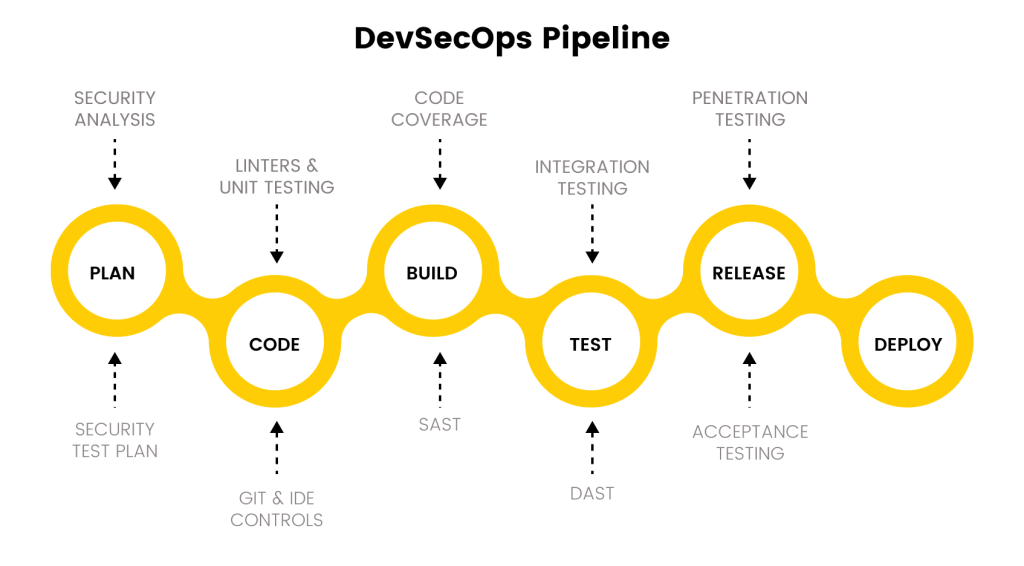1. What is DevSecOps?
DevSecOps integrates security practices into the DevOps process, combining development, security, and operations. This course covers tools such as Jenkins, Docker, Kubernetes, Ansible, and SonarQube—all critical for establishing security practices across the software development lifecycle (SDLC).

Introduction to Tools:
Jenkins: CI/CD automation, enabling early and automated security testing.
Docker & Kubernetes: Container security and orchestration.
Ansible: Automated configuration management with secure deployments.
2. Why DevSecOps is Important?
- Value to Learn: As security threats evolve, embedding security into DevOps ensures that applications are resilient and compliant. DevSecOps aligns security with agility, enabling organizations to deploy secure code quickly and confidently.
- Career Relevance: DevSecOps is in high demand, with companies looking for skilled professionals who can integrate security into DevOps pipelines and meet compliance requirements.
3. Course Features
Certification: Approved certification from DevOpsSchool upon course completion.
Comprehensive Curriculum: Covers security tools, best practices, and real-world applications in DevSecOps.
Hands-On Labs: Practical labs that involve setting up security in CI/CD pipelines and automated monitoring.
Interactive Sessions: Live sessions with Rajesh Kumar, including Q&A to clarify concepts.
4. Training Objectives
Skill Outcomes: Proficiency in setting up secure CI/CD pipelines, using container security tools, managing cloud security, and implementing security monitoring.
Goal: Equip participants with skills to integrate security in the DevOps process, covering aspects like CI/CD security, configuration management, and automated vulnerability assessments.
5. Target Audience
Educational Background: IT, computer science, or security backgrounds, though not mandatory.
Who Should Attend:
Roles: Developers, DevOps engineers, IT security professionals, and system administrators.
Experience Level: Intermediate; basic familiarity with DevOps practices is beneficial.
6. Training Methodology
- Format: Combination of lectures, hands-on labs, workshops, and interactive discussions.
- Delivery: Includes live demos, theoretical lectures for background knowledge, and group projects for hands-on experience.

7. Training Materials
- Provided Materials:
- Presentations and slides, security checklists, configuration guides.
- Recorded video tutorials for future reference.
- Practical handouts for each tool used.
8. Evaluation
- Methods:
- Pre-Training Assessment: A quick quiz to evaluate participants’ initial knowledge.
- Post-Training Assessment: A final exam to test understanding and skill mastery.
- Feedback Survey: A survey to gather feedback and measure course effectiveness.
9. Certification Program
- Certification Coverage: After completing this training, participants are eligible for:
- Certified DevSecOps Engineer (by DevOpsSchool)
- Jenkins Security Certification
- Certified Kubernetes Security Specialist
- Certification Process: Certification is granted upon successful completion of the post-training assessment and hands-on labs.
10. Agenda Daywise
| Day | Topics Covered |
|---|---|
| Day 1 | Introduction to DevSecOps, Basic Security Concepts, Overview of CI/CD Security with Jenkins |
| Day 2 | Docker & Kubernetes Security Fundamentals, Container Security Best Practices |
| Day 3 | Ansible for Secure Configuration Management, Implementing Automated Security Checks |
| Day 4 | Vulnerability Scanning with SonarQube, Setting up Continuous Security Testing in Pipelines |
| Day 5 | Monitoring & Incident Response in DevSecOps, Project Simulation & Final Review |
11. Trainers
Instructor: Rajesh Kumar, an experienced DevSecOps practitioner and trainer, specializing in secure DevOps practices, automation, and compliance.
13. FAQ
Q1:What is DevSecOps?
A: DevSecOps integrates security into DevOps, ensuring that code is secure from development to deployment.
Q2:Is prior DevOps experience needed?
A: Basic knowledge of DevOps practices is helpful, but not required.
Q3:What certification will I receive?
A: You’ll receive the DevSecOps Master Certification endorsed by DevOpsSchool.
Q4:Which tools are covered in this course?
A: Key tools include Jenkins, Docker, Kubernetes, Ansible, and SonarQube.
Q5:How is the course delivered?
A: The course includes live online sessions, hands-on labs, and interactive workshops.
Q6:Is there a final exam?
A: Yes, participants take a final assessment to qualify for certification.
Q7:Are training materials provided?
A: Yes, you’ll receive handouts, videos, and slides.
Q8:Can I access the course materials afterward?
A: Yes, all materials are accessible post-training.
Q9:What is the duration of the course?
A: The training spans 5 days with additional time for certification.
Q10:What is included in lab setup support?
A: Step-by-step guidance is provided to set up tools and environments.
videos
What do participants think about our certification?
Participants have shared overwhelmingly positive feedback about the DevSecOps Certification Program offered by DevOpsSchool and led by Rajesh Kumar. Here’s what they’ve highlighted:
- Real-World Relevance: Many appreciate that the course content is highly relevant to real-world DevSecOps challenges, making them feel prepared to apply their new skills directly in their jobs.
- Thorough Coverage of Tools and Techniques: Participants value the in-depth coverage of security tools such as Jenkins, Docker, Kubernetes, and SonarQube, which they find essential for building a secure DevOps pipeline.
- Interactive Learning Experience: The live, instructor-led format has been a hit, with many commenting that Rajesh Kumar’s interactive teaching style and willingness to answer questions make the course engaging and informative.
- Hands-On Practice: Practical labs and hands-on projects are frequently praised, with participants noting that these labs enhance their understanding of DevSecOps by providing a real-world context.
- Career Boost: Many certified participants report that the certification has significantly improved their professional credibility, giving them a competitive edge and increasing their job opportunities in DevSecOps roles.
- Supportive Learning Environment: Participants consistently appreciate the helpful support materials and resources provided, as well as Rajesh Kumar’s guidance in setting up tools and resolving technical challenges.
- Structured and Clear Curriculum: The structured format, step-by-step guidance, and comprehensive curriculum allow participants to progress confidently, building their knowledge incrementally.